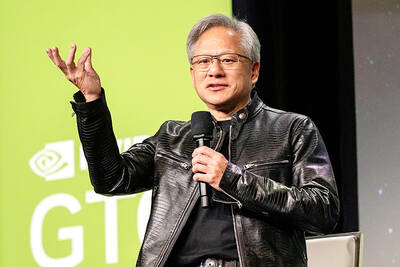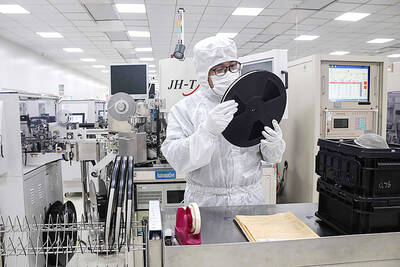Honda Motor Co, the world's biggest maker of motorcycles, won a court ruling stopping a Chinese company from selling Hongda brand motorbikes, adding to signs China is getting tougher on intellectual property theft.
A Beijing court told Chongqing Lifan Industry Group Co (重慶力帆實業) to pay Honda 1.47 million yuan (US$177,600) in damages and cease sales or exports of Hongda motorcycles, Honda spokesman Masaya Nagai said today. Gao Zhihai, a spokesman at No. 2 Intermediate People's Court of Beijing, said Lifan lost the suit yesterday.
Honda, General Motors Corp and Toyota Motor Corp have all sued Chinese companies, arguing lookalike designs or logos are costing them business in the world's third-largest auto market.
China's Supreme People's Court increased penalties for copying software, movies and other intellectual property this month, responding to pressure from the US and the EU.
"China's government is taking the international trademark and patent issues more seriously and it has to," said Paul Gao, a Shanghai-based principal and automotive analyst at McKinsey & Co, which advises foreign carmakers on investing in China.
Tokyo-based Honda's shares rose 0.8 percent to 5,300 yen and at the close of trade in Tokyo.
Imposing tougher penalties on trademark and copyright pirates may help China head off the threat of WTO actions by the US and EU. The US has said piracy is the biggest problem in the US$181 billion commercial relationship between the two nations.
Toyota last year lost a suit against China Geely Group Co (吉利控股), which it accused of using a logo that looks like the Japanese carmaker's marque. Yamaha Motor Co in 2002 received 900,000 yuan in damages from Tianjin Gangtian Corp and won a court order stopping the company from selling a lookalike scooter.
General Motors' South Korean unit GM Daewoo Auto & Technology Co last week sued Chery Automobile Co (奇瑞汽車), claiming that the Chinese carmaker's QQ minicars used parts and designs from its Matiz minicar without permission. GM Daewoo's spokesman Rob Leggat could not be reached for comment.
Honda's victory "is a sign of the growing maturity of intellectual property rights recognition among China's judges and lawyers," said Guan Anping, managing partner of Anping & Partners, a Beijing-based law firm specializing in intellectual property rights. "The government is strengthening legislation and courts are beginning to enforce laws."
Lifan, based in southwestern China's Chongqing municipality, is the nation's largest privately owned maker of two-wheel vehicles. An official responsible for Lifan's intellectual property rights declined to comment. Lifan's chairman Yin Mingshan couldn't be reached to comment on yesterday's verdict.
Lifan makes 1 million motorcycles and 2 million engines a year, according to its Web site. The company, started with 200,000 yuan of capital 12 years ago, reported a 15 percent increase sales last year to 4.6 billion yuan. The company's latest available income figure was in 2002, when it earned 205 million yuan in pretax profit, according to its Web site.
Honda expects to sell 12.5 million two-wheel vehicles next year, 17 percent more than this year, according to a forecast made last week. Honda owns three motorcycle ventures in the Chinese cities of Chongqing, Guangzhou and Haikou.

‘DECENT RESULTS’: The company said it is confident thanks to an improving world economy and uptakes in new wireless and AI technologies, despite US uncertainty Pegatron Corp (和碩) yesterday said it plans to build a new server manufacturing factory in the US this year to address US President Donald Trump’s new tariff policy. That would be the second server production base for Pegatron in addition to the existing facilities in Taoyuan, the iPhone assembler said. Servers are one of the new businesses Pegatron has explored in recent years to develop a more balanced product lineup. “We aim to provide our services from a location in the vicinity of our customers,” Pegatron president and chief executive officer Gary Cheng (鄭光治) told an online earnings conference yesterday. “We

It was late morning and steam was rising from water tanks atop the colorful, but opaque-windowed, “soapland” sex parlors in a historic Tokyo red-light district. Walking through the narrow streets, camera in hand, was Beniko — a former sex worker who is trying to capture the spirit of the area once known as Yoshiwara through photography. “People often talk about this neighborhood having a ‘bad history,’” said Beniko, who goes by her nickname. “But the truth is that through the years people have lived here, made a life here, sometimes struggled to survive. I want to share that reality.” In its mid-17th to

‘MAKE OR BREAK’: Nvidia shares remain down more than 9 percent, but investors are hoping CEO Jensen Huang’s speech can stave off fears that the sales boom is peaking Shares in Nvidia Corp’s Taiwanese suppliers mostly closed higher yesterday on hopes that the US artificial intelligence (AI) chip designer would showcase next-generation technologies at its annual AI conference slated to open later in the day. The GPU Technology Conference (GTC) in California is to feature developers, engineers, researchers, inventors and information technology professionals, and would focus on AI, computer graphics, data science, machine learning and autonomous machines. The event comes at a make-or-break moment for the firm, as it heads into the next few quarters, with Nvidia CEO Jensen Huang’s (黃仁勳) keynote speech today seen as having the ability to

The battle for artificial intelligence supremacy hinges on microchips, but the semiconductor sector that produces them has a dirty secret: It is a major source of chemicals linked to cancer and other health problems. Global chip sales surged more than 19 percent to about US$628 billion last year, according to the Semiconductor Industry Association, which forecasts double-digit growth again this year. That is adding urgency to reducing the effects of “forever chemicals” — which are also used to make firefighting foam, nonstick pans, raincoats and other everyday items — as are regulators in the US and Europe who are beginning to